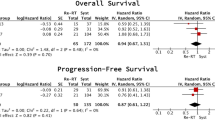Background:
Whole brain radiation therapy (WBRT) is reported to improve local control after resection of brain metastases. Improvement of survival was only observed in patients with controlled extracranial disease. The optimum radiation schedule has yet to be defined. The authors’ experience with a postoperative approach including WBRT and a radiation boost to the metastatic site is presented.
Patients and Methods:
Criteria for inclusion into this retrospective analysis were solitary brain metastasis, Karnofsky performance status ≥ 70%, and controlled extracranial disease. Two therapies were compared for local control and survival: surgery followed by 40 Gy WBRT (group A) versus surgery followed by 40 Gy WBRT and a 10 Gy boost (group B). Statistical analysis was performed using the Kaplan-Meier method and log-rank test.
Results:
33 patients were included (17 group A, 16 group B). The results suggested better local control (p = 0.0087) and survival (p = 0.0023) for group B. 17/17 patients (100%) of group A and 13/16 patients (81%) of group B showed progression of brain metastasis, 8/17 and 3/16 patients in the area of metastatic surgery. Median time to progression was 7 (1–22) months in group A and 12 (3–42) months in group B. The number of cancer-related deaths amounted to 17/17 (100%) in group A after a median interval of 9 (3–26) months, and to 9/16 (56%) in group B after 14 (4–46) months.
Conclusion:
After resection of solitary brain metastasis, a radiation boost in addition to WBRT seems to improve local control and survival when compared to postoperative WBRT alone. The results should be confirmed in a larger prospective trial.
Hintergrund:
Gemäß Literatur führt eine Ganzhirnbestrahlung nach Resektion von Hirnmetastasen zu einer besseren lokalen Kontrolle. Ein besseres Gesamtüberleben wurde nur für Patienten mit kontrollierten extrazerebralen Manifestationen beschrieben. Das optimale Strahlentherapieregime ist bisher nicht geklärt. Erfahrungen mit einem postoperativen Regime, bestehend aus Ganzhirnbestrahlung und Boost der Metastasenregion, werden präsentiert.
Patienten und Methodik:
Einschlusskriterien für diese retrospektive Analyse waren: Vorliegen einer solitären Hirnmetastase, Karnofsky-Index ≥ 70% und Kontrolle extrazerebraler Manifestationen (Tabelle 1). Zwei Therapien wurden für die lokale Kontrolle und das Gesamtüberleben verglichen: Metastasenresektion mit anschließender Ganzhirnbestrahlung bis 40 Gy (Gruppe A) versus Resektion mit anschließender Ganzhirnbestrahlung bis 40 Gy und einem Boost von 10 Gy (Gruppe B). Die statistische Analyse erfolgte mittels Kaplan-Meier-Methode und Log-Rank-Test.
Ergebnisse:
33 Patienten wurden eingeschlossen (17 Gruppe A, 16 Gruppe B). Der Vergleich beider Gruppen ergab eine bessere lokale Kontrolle (p = 0,0087) und ein besseres Gesamtüberleben (p = 0,0023) für Gruppe B (Abbildung 1). Bei 17/17 Patienten (100%) in Gruppe A und 13/16 Patienten (81%) in Gruppe B zeigte sich ein intrazerebraler Progress, bei 8/17 und 3/16 Patienten im Bereich der resezierten Metastase. Das mediane progressionsfreie Intervall betrug 7 (1–22) Monate in Gruppe A und 12 (3–42) Monate in Gruppe B. In Gruppe A verstarben 17/17 Patienten (100%) nach median 9 (3–26) Monaten tumorbedingt, in Gruppe B 9/16 Patienten (56%) nach median 14 (4–46) Monaten.
Schlussfolgerung:
Nach Resektion solitärer Hirnmetastasen scheint ein zusätzlich zur Ganzhirnbestrahlung applizierter Boost der Metastasenregion die lokale Kontrolle und das Überleben zu verbessern. Die Ergebnisse müssen an einem größeren Kollektiv in Form einer prospektiven Studie überprüft werden.
Similar content being viewed by others
Author information
Authors and Affiliations
Corresponding author
Rights and permissions
About this article
Cite this article
Rades, D., Raabe, A., Bajrovic, A. et al. Treatment of Solitary Brain Metastasis. Strahlenther Onkol 180, 144–147 (2004). https://doi.org/10.1007/s00066-004-1159-8
Received:
Accepted:
Issue Date:
DOI: https://doi.org/10.1007/s00066-004-1159-8




